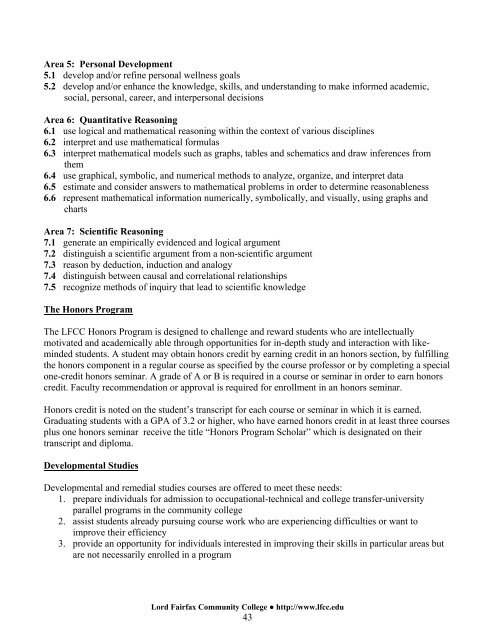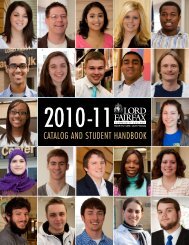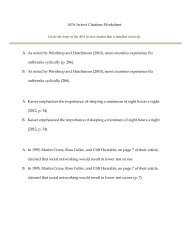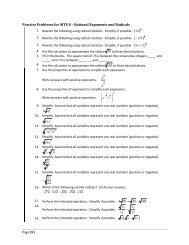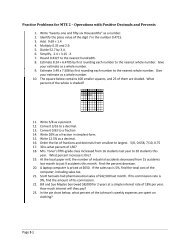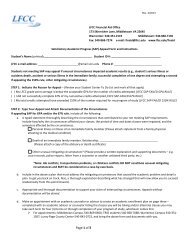Catalog and Student Handbook - Lord Fairfax Community College
Catalog and Student Handbook - Lord Fairfax Community College
Catalog and Student Handbook - Lord Fairfax Community College
Create successful ePaper yourself
Turn your PDF publications into a flip-book with our unique Google optimized e-Paper software.
Area 5: Personal Development<br />
5.1 develop <strong>and</strong>/or refine personal wellness goals<br />
5.2 develop <strong>and</strong>/or enhance the knowledge, skills, <strong>and</strong> underst<strong>and</strong>ing to make informed academic,<br />
social, personal, career, <strong>and</strong> interpersonal decisions<br />
Area 6: Quantitative Reasoning<br />
6.1 use logical <strong>and</strong> mathematical reasoning within the context of various disciplines<br />
6.2 interpret <strong>and</strong> use mathematical formulas<br />
6.3 interpret mathematical models such as graphs, tables <strong>and</strong> schematics <strong>and</strong> draw inferences from<br />
them<br />
6.4 use graphical, symbolic, <strong>and</strong> numerical methods to analyze, organize, <strong>and</strong> interpret data<br />
6.5 estimate <strong>and</strong> consider answers to mathematical problems in order to determine reasonableness<br />
6.6 represent mathematical information numerically, symbolically, <strong>and</strong> visually, using graphs <strong>and</strong><br />
charts<br />
Area 7: Scientific Reasoning<br />
7.1 generate an empirically evidenced <strong>and</strong> logical argument<br />
7.2 distinguish a scientific argument from a non-scientific argument<br />
7.3 reason by deduction, induction <strong>and</strong> analogy<br />
7.4 distinguish between causal <strong>and</strong> correlational relationships<br />
7.5 recognize methods of inquiry that lead to scientific knowledge<br />
The Honors Program<br />
The LFCC Honors Program is designed to challenge <strong>and</strong> reward students who are intellectually<br />
motivated <strong>and</strong> academically able through opportunities for in-depth study <strong>and</strong> interaction with likeminded<br />
students. A student may obtain honors credit by earning credit in an honors section, by fulfilling<br />
the honors component in a regular course as specified by the course professor or by completing a special<br />
one-credit honors seminar. A grade of A or B is required in a course or seminar in order to earn honors<br />
credit. Faculty recommendation or approval is required for enrollment in an honors seminar.<br />
Honors credit is noted on the student’s transcript for each course or seminar in which it is earned.<br />
Graduating students with a GPA of 3.2 or higher, who have earned honors credit in at least three courses<br />
plus one honors seminar receive the title “Honors Program Scholar” which is designated on their<br />
transcript <strong>and</strong> diploma.<br />
Developmental Studies<br />
Developmental <strong>and</strong> remedial studies courses are offered to meet these needs:<br />
1. prepare individuals for admission to occupational-technical <strong>and</strong> college transfer-university<br />
parallel programs in the community college<br />
2. assist students already pursuing course work who are experiencing difficulties or want to<br />
improve their efficiency<br />
3. provide an opportunity for individuals interested in improving their skills in particular areas but<br />
are not necessarily enrolled in a program<br />
<strong>Lord</strong> <strong>Fairfax</strong> <strong>Community</strong> <strong>College</strong> ● http://www.lfcc.edu<br />
43


